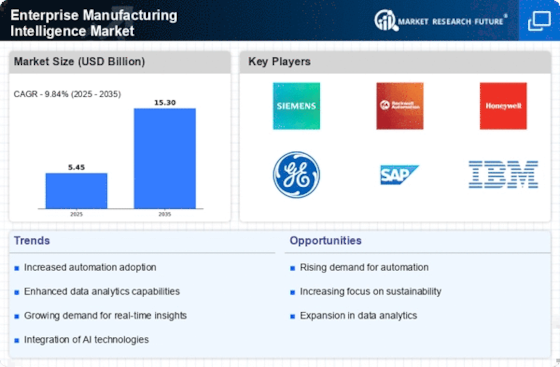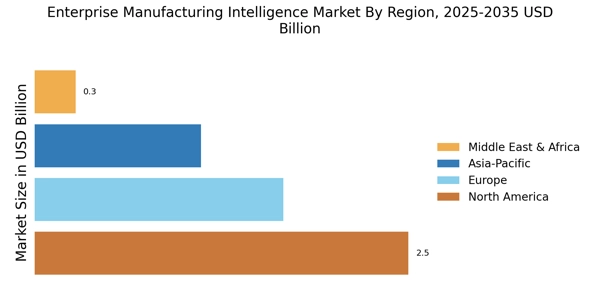Advancements in IoT Technology
The proliferation of Internet of Things (IoT) technology is significantly influencing the Enterprise Manufacturing Intelligence Market. IoT devices facilitate seamless communication between machines, enabling manufacturers to gather and analyze data from various sources. This interconnectedness allows for enhanced monitoring of production processes and predictive maintenance, which can lead to substantial cost savings. The IoT market in manufacturing is expected to grow at a compound annual growth rate of 25% over the next five years. As manufacturers adopt IoT solutions, the demand for enterprise manufacturing intelligence tools that can process and analyze this data will likely increase, driving market expansion.
Emphasis on Operational Efficiency
The relentless pursuit of operational efficiency serves as a crucial driver in the Enterprise Manufacturing Intelligence Market. Companies are increasingly focused on streamlining processes to reduce waste and enhance productivity. This trend is underscored by the fact that organizations that implement manufacturing intelligence solutions can achieve up to a 30% reduction in operational costs. As competition intensifies, manufacturers are compelled to adopt advanced technologies that provide insights into their operations. Consequently, the demand for enterprise manufacturing intelligence solutions that facilitate continuous improvement and operational excellence is expected to rise, further fueling market growth.
Regulatory Compliance and Quality Control
The stringent regulatory landscape surrounding manufacturing processes is a significant driver for the Enterprise Manufacturing Intelligence Market. Compliance with industry standards and regulations necessitates robust quality control measures, which can be effectively managed through manufacturing intelligence solutions. Companies are increasingly investing in technologies that ensure adherence to regulations while maintaining product quality. The market for compliance management solutions in manufacturing is projected to grow substantially, as organizations seek to mitigate risks associated with non-compliance. This trend underscores the importance of enterprise manufacturing intelligence tools in facilitating compliance and quality assurance, thereby driving market demand.
Growing Adoption of Predictive Maintenance
The shift towards predictive maintenance is emerging as a key driver in the Enterprise Manufacturing Intelligence Market. By leveraging data analytics and machine learning, manufacturers can anticipate equipment failures before they occur, thereby minimizing downtime and maintenance costs. The predictive maintenance market is expected to reach USD 12 billion by 2025, reflecting the increasing recognition of its benefits. As manufacturers seek to enhance reliability and efficiency, the adoption of predictive maintenance strategies will likely accelerate, leading to a heightened demand for enterprise manufacturing intelligence solutions that support these initiatives.
Rising Demand for Real-Time Data Analytics
The increasing need for real-time data analytics is a pivotal driver in the Enterprise Manufacturing Intelligence Market. Manufacturers are increasingly recognizing the value of data-driven decision-making, which enhances operational efficiency and reduces downtime. According to recent estimates, the market for data analytics in manufacturing is projected to reach USD 20 billion by 2026. This surge is attributed to the growing complexity of manufacturing processes and the necessity for immediate insights to optimize production. As organizations strive to remain competitive, the integration of real-time analytics into manufacturing operations becomes essential, thereby propelling the growth of the Enterprise Manufacturing Intelligence Market.
















